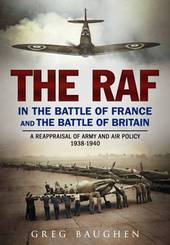
|
The RAF in the Battle of France and the Battle of Britain: A Reappraisal of Army and Air Policy 1938-1940
Hardback
Main Details
| Title |
The RAF in the Battle of France and the Battle of Britain: A Reappraisal of Army and Air Policy 1938-1940
|
| Authors and Contributors |
By (author) Greg Baughen
|
| Physical Properties |
|
| Category/Genre | British and Irish History
Second world war |
|---|
| ISBN/Barcode |
9781781555255
|
| Classifications | Dewey:940.544941 |
|---|
| Audience | |
|---|
|
Publishing Details |
| Publisher |
Fonthill Media Ltd
|
| Imprint |
Fonthill Media Ltd
|
| Publication Date |
30 September 2016 |
| Publication Country |
United Kingdom
|
Description
In May 1940, the opposing German and Allied forces seemed reasonably well matched. On the ground, the four allied nations had more troops, artillery and tanks. Even in the air, the German advantage in numbers was slight. Yet two months later, the Allied armies had been crushed. The Netherlands, Belgium and France had all surrendered and Britain stood on her own, facing imminent defeat. Subsequent accounts of the campaign have tended to see this outcome as predetermined, with the seeds of defeat sown long before the fighting began. Was it so inevitable? Should the RAF have done more to help the Allied armies? Why was such a small proportion of the RAF's frontline strength committed to the crucial battle on the ground? Could Fighter Command have done more to protect the British and French troops being evacuated from the beaches of Dunkirk? This study looks at the operations flown and takes a fresh look at the fatal decisions made behind the scenes, decisions that unnecessarily condemned RAF aircrews to an unequal struggle and ultimately ensured Allied defeat. What followed became the RAF's finest hour with victory achieved by the narrowest of margins. Or was it, as some now suggest, a victory that was always inevitable? If so, how was the German military juggernaut that had conquered most of Europe so suddenly halted? This study looks at the decisions and mistakes made by both sides. It explains how the British obsession with bomber attacks on cities had led to the development of the wrong type of fighter force and how only a fortuitous sequence of events enabled Fighter Command to prevail. It also looks at how ready the RAF was to deal with an invasion. How much air support could the British Army have expected? Why were hundreds of American combat planes and experienced Polish and Czech pilots left on the sidelines? And when the Blitz began, and Britain finally got the war it was expecting, what did this campaign tell us about the theories on air power that had so dominated pre-war air policy? All these questions and more are answered in Greg Baughen's third book. Baughen describes the furious battles between the RAF and the Luftwaffe and the equally bitter struggle between the Air Ministry and the War Office - and explains how close Britain really came to defeat in the summer of 1940.
Author Biography
Greg Baughen was educated at Sussex University where he obtained a degree in Mathematics. In a varied teaching career, he has taught Maths and English as a Foreign Language, to children and adults, in Britain and abroad. His interest in military aviation was sparked at a very early age by curiosity over the defeat of British and French air forces in the Battle of France in 1940. For forty years, he has delved though public archives in Britain and France seeking explanations. The quest has taken him back to the origins of air power in both countries and forwards to what might have been in the Cold War. In between marking homework and bringing up a family, he set to work writing a definitive history of air power in both countries. Retirement has provided the time to turn these drafts into polished books. Seven drafts exist in all. Six of these take the history of British air power from the turn of the 20th century up to 1970 and a seventh covers the history of the French Air Force up to 1940. Blueprint for Victory and The Rise of the Bomber were the first two in the series on British air power. The RAF in the Battle of France and Battle of Britain is the third and takes the story up to 1940. The huge volume of new information uncovered over the years has also provided the basis for a series of spin-offs. The first of these will be a reappraisal of the career of the Fairey Battle. Greg Baughen's career has now turned full circle as he makes use of the teaching skills acquired over the years to turn some of the themes developed in these books into an increasingly sought after series of talks and lectures.
Reviews"This really an amazing and detailed publication of the perilous time the RAF and the English people faced during 1940... This is an excellent work of history. For those aircraft and history buffs interested in the early part of World War II air battles this book will offer a wealth of information. It was extremely interesting to read about the various theories of combating Nazi aggression early in the war. I recommend this book as a very enjoyable and informative read."-- "IPMS/USA" "An interesting account of a period in the war that is well known, but which tackles aspects of it which are far less well known... intriguing... an interesting take on the whole topic." -- "Military Model Scene" (3/1/2017 12:00:00 AM)
|